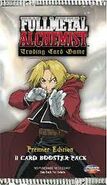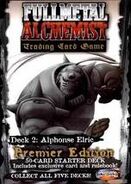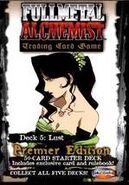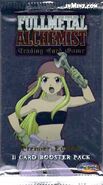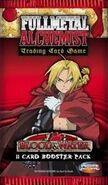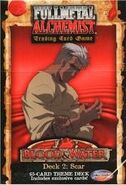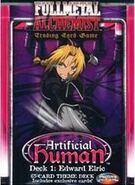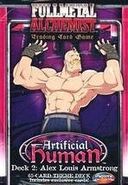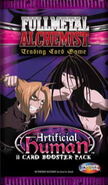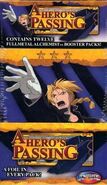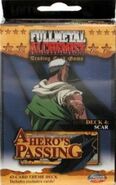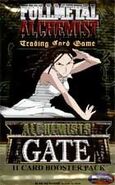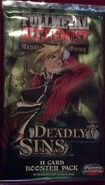'This article is about the Trading Card Game. Were you looking for the Game of the same name?
The trading card game was introduced in 2005 in the US by Joyride Entertainment. Seven expansion packs were released. The game was then retired on July 11th, 2007.
The seven expansion sets released are:
- Premier Edition
- Blood & Water
- Artificial Humans
- A Hero's Passing
- Alchemist's Gate
- Seven Deadly Sins
- Sacrifice
Card Rarity[]
The rarity of the cards is as follows:
- Common: Just a regular card, has a C in the bottom right-hand corner. 7:1 pack.
- Uncommon: Looks regular, but is a short-printed card. Has a U in the bottom right-hand corner. 3:1 pack.
- Rare: Looks regular, but is even shorter printed than uncommon. Has an R in the bottom right-hand corner. These cards are usually better for gameplay, but some are exceptions. 1:1 pack.
- Foil: Is holographic, and even rarer than rare. Can be any card in the base of the set. Has the card's rarity in the bottom right-hand corner. Most people prefer the holographic because they are rarer than the normal cards, and are prettier than the usual card, although the foil still has the same picture. Foil versions of any card in their set were discontinued after Artificial Human. 1:3 packs.
- Fixed: These cards are found in all Starter and Theme decks. Premier Edition were normal cards, while Blood and Water and Artificial Human fixed cards are foiled. Marked with the F in the bottom right corner. 1:1 Deck (Premier Edition) 3:1 Deck (BW and AH)
- Chase: A chase card is an alternate template print of a card in the base of the set. These cards are always foiled. An X is found in the lower right corner. 1:24 packs.
- Chase Exclusive: Commonly referred to as "Black Film" or "Filmstrip" cards, these cards are only available as Chases. They have a unique design compared to other chase cards. These are only found as Leaders and Locations. These cards are usually better than the normal cards in the base of the set, but there are also exceptions. These are the most sought after cards. These have Xe in the bottom right corner. Additional Chase Exclusive cards that acted as "previews" of the upcoming sets were also available, and marked simply with "X." 1:24 Packs.
- Transmutated: Is see-through, completely clear except the pictures and the card's effects. Can only be Leader cards. Has a T in the bottom right-hand corner. 1:80 packs.
Types of Cards[]
There are seven types of cards:
- Leader cards: Your leading character. Has a green flag in the top left-hand corner, with his or her command (the number of points he/she has to recruit allies and equip items to themselves) inside of it. If this character is defeated in battle, you must use your free recovery on them, without exception.
- Ally cards: Characters you can recruit. Has a gold coin in the top left-hand corner, with the recruit cost inside of it. You can recruit as many allies as you want per turn, as long as your leader has the command to do it.
- Event cards: Cards that you can play during the phase written on the cards. Usually has a cost of Alchemy, Wits, or Strength (designated in the top right-hand corner of the card as the symbol of alchemy, wits, or strength with a number inside of it).
- Attachment cards: Cards you can equip to Ally or leader cards, or cards that help you in some way. Has a silver coin in the top-left hand corner, with a cost inside of them.
- Location cards: Cards that have clue points on them. Has an incomplete philosopher's stone with a number inside of them, indicating the number of clue point they have. Also, they usually have an effect on them which benefits or hurts you and your opponent. These are the main cards with which you win.
- Advantage: A blue card with the ally gold coin in the top left corner. These are played in the recruit phase, but don't count towards your maximum ally limit. You use command to play these, similar to allies. Usually grants an active or passive ability that can affect both players.
- Philosopher's Stones: Red cards with a stone icon in the upper left corner. Can only be played after winning a number of locations equal to the Stone's cost. Usually grants a passive or active ability that any of your character can use. Playing a Stone ability or Event costs a number of cards from the top of your deck, which are then placed under your Philosopher's Stone card. Once the number of cards has equaled the value of the Philosopher's Stone, it is discarded.
Factions[]
There are four main factions. Factions designate who the recruit or leader is loyal to.
- Elric: Has the snake-over-cross (crucified serpent) symbol, also called Flamel's Caduceus, in the upper right-hand corner. Characters such as Edward Elric, Tim Marcoh, and Alphonse Elric share this faction.
- Rebel: Has Psiren's Transmutation Circle in the upper right-hand corner. Characters such as Scar, Father Cornello, and Psiren share this faction.
- Military: Has a Military Crest in the upper right-hand corner. Characters such as Roy Mustang, Alex Louis Armstrong, Basque Grand, and Maes Hughes share this faction.
- Homunculi: Has an Ouroboros in the upper right-hand corner. Characters such as Envy, Shou Tucker and Lust share this faction.
- Unaligned: Not really a faction. It has no faction symbol, and these leaders get the recruit penalty for any ally that has a faction. The only factionless leader is Majhal. Also, note that unaligned allies do not have a recruit penalty, and can be played in your starting team.
Card types 2[]
In addition to a faction, Allies also have certain characteristics written on the card.
Ally card types:
- Human
- Sin (Homunculi characters)
- Soldier
- State Alchemist
- Chimera
- Hero
- Villain
- Mob (can have more than one of these in play)
- Ishbalite
Note that hero leaders cannot recruit villain allies, and vice-versa.
Attachments also have their own types. No more than one of each type can be attached to a character, except for Auto-Mail, of which two may be equipped.
Attachment card types:
- Mark
- Unique (Cannot have more than one of that card in play)
- Auto-mail
- Animal
- Weapon
- Armor
- Item
- Oath
Phases of the game[]
These are the phases that one turn consists of.
- Draw Phase: The phase in which you draw (Usually) Two cards from your deck
- Power-up Phase: The Phase in which you either gain an experience by placing a card from the top of your deck under your leader or level your leader up by placing the correct amount of experience in the discard pile and placing your next leader on the field. You also reveal your locations in this phase.
- Recruit Phase: The phase in which you can recruit allies to your team. You cannot recruit allies with more of a recruit cost than your leader has, though you can recruit more than one ally, as long as it equals or is lower than your leader's recruit points, altogether.
- Main Phase: The phase in which you play main events or abilities, or play attachment cards.
- Search Phase: The phase in which your allies and leaders battle to win the current location. Note that you can lose the game if you send out all of your allies and your leader and they are all defeated. Whoever comes out with the current location's requirements win the location, and get as many location points as printed on the card.
- Cleanup Phase: The phase in which your defeated allies are either saved or sent to the discard pile or defeated, and all set allies are unset. Each player may recover one character free of cost, and must recover their leader if they have been defeated. Additional allies may be recovered by discarding a copy of that ally from your hand.
Common Terminology[]
Set: The ally or leader is set, and cannot assign to a search party or attack, if already in a search party.
Defeated: The ally is flipped face-down and cannot assign to a search party, attack, and may be discarded at the end of the search phase.
RFG: The card is removed from the game.
Blocked: The attack is redirected to from one character to another that has the ability to block.
React: An event or ability played in reaction to a specified action.
Alchemy, wits, and strength events/abilities: Events that require a certain cost of alchemy, wits, or strength.
Search, main, recruit, and battle events/abilities: Events or abilities that can only take place on the search, battle, recruit, or main phase, depending on what the text says.
Equivalent exchange: A mechanic where the player may discard any number of cards to reduce the cost of an event or activated ability by the same amount of cards discarded.
Discard: Send a card from your hand or deck to the discard pile.
Destroy: Send an attachment card from the field to the discard pile.
Sacrifice: Send an ally from the field to the discard pile to meet a certain cost.
Broken: A card that has such a good ability that it is almost unfair to the opposing player.

